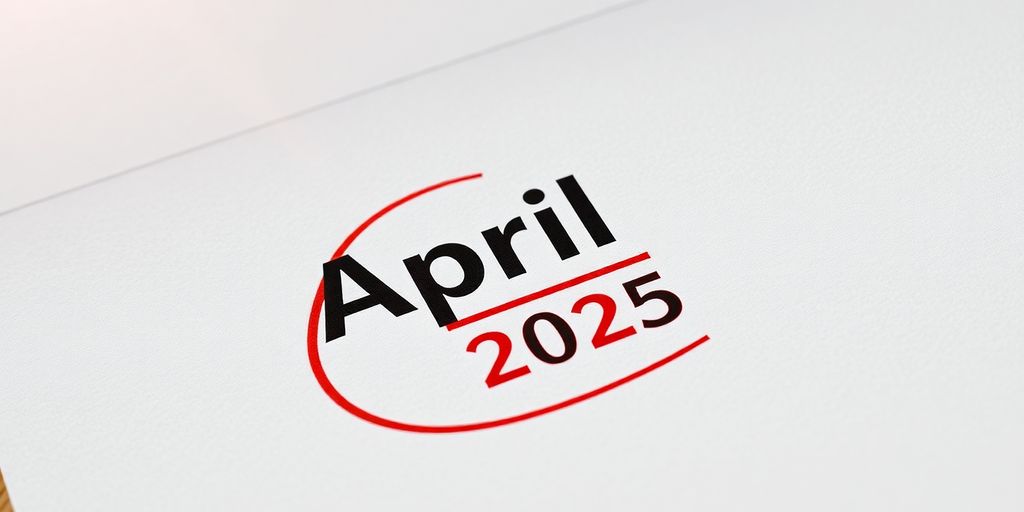So, the new year’s rolled around, and if you’re like most people, you’re probably wondering about the income tax return 2025 deadline. It’s easy to let these things slip your mind, especially with everything else going on. But don’t worry, we’ve got you covered. This guide breaks down all the important dates and what you need to know to stay on track, whether you’re filing early or cutting it a bit close. Let’s get this sorted, so you can get on with your year.
Key Takeaways
- The main deadline for your 2024 income tax return is Tuesday, April 15, 2025. If you’re overseas, you get a bit more time to file, but any tax you owe is still due by the April date.
- Need more time? You can ask for an extension by April 15, which pushes your filing deadline to October 15, 2025. Just remember, this extension is for filing, not for paying what you owe.
- Missing the deadline when you owe money means penalties and interest. It’s best to file and pay as much as you can, even if you can’t pay the full amount right away. If you’re due a refund, there’s no penalty for filing late, but you should still file to get your money back.
- Keep an eye on other important dates too, like estimated tax payments (due January 15, 2025, for the last quarter) and deadlines for employers to send out W-2s (January 31, 2025).
- State tax deadlines usually match the federal ones, but it’s smart to double-check with your specific state’s revenue department, especially since some states don’t have an income tax at all.
Understanding The 2025 Income Tax Return Deadline
Right then, let’s get down to the nitty-gritty of the 2025 income tax return deadline. It’s that time of year again, and while it might not be the most thrilling topic, knowing the dates is pretty important if you want to avoid any unnecessary headaches.
Key Filing Dates For Your 2025 Return
So, what are the big dates you need to have circled in your calendar? For most Aussies, the main event is April 15, 2025. This is the day you absolutely must have your federal income tax return filed with the Australian Taxation Office (ATO), or at the very least, have lodged an extension request. It’s not just about getting the paperwork in; it’s also the day any tax you owe needs to be paid. If you’re living overseas, you usually get a bit more time, often until June 16, but remember, any tax due is still expected by the original April date.
When Are Taxes Due In 2025?
As mentioned, the general rule for federal income tax returns is April 15, 2025. This date can shift if it lands on a weekend or a public holiday, so it’s always worth double-checking closer to the time. For those who are self-employed or have income not covered by standard withholding, you’ll also have quarterly estimated tax payments due throughout the year. The first of these for the 2025 tax year is typically due around April 15 as well.
Navigating The Federal Income Tax Return Deadline
It’s not just a simple date; there are a few things to consider. If you’re filing electronically, your return is considered on time if it’s transmitted by 11:59 PM in your local time zone on April 15. If you’re mailing it in, make sure it’s properly addressed, has enough postage, and is postmarked by the deadline.
Remember, an extension to file your return doesn’t mean an extension to pay what you owe. You still need to estimate your tax bill and pay it by the original deadline to avoid penalties and interest.
Here’s a quick rundown of some other important dates that might affect you:
- January 31, 2025: Employers must send out your W-2 forms. You’ll need this to file.
- January 31, 2025: You should also expect to receive various 1099 forms if you’re a freelancer or have received interest income.
- April 15, 2025: This is also the final day to make contributions to your Health Savings Account (HSA) or Individual Retirement Account (IRA) for the previous tax year.
It’s a lot to keep track of, but getting a handle on these key dates early can save you a lot of stress later on.
Extensions And Special Circumstances
Life happens, and sometimes getting your tax return sorted by the usual deadline just isn’t possible. Don’t panic though, there are options available if you need more time or if your circumstances are a bit unusual.
Key Filing Dates For Your 2025 Return
While the main event is April 15th, it’s good to know the other dates that might affect you. For instance, employers need to get those W-2 forms out to you by January 31st. This is the info you’ll need to actually file your return, so keep an eye out for it. Other information returns, like 1099s for freelancers or interest income, also generally need to be with you by the end of January. Missing these can throw a spanner in the works for your filing plans.
When Are Taxes Due In 2025?
For most people, the big day is April 15th, 2025. This is the date you need to have your tax return filed or have an extension in place. It’s also the deadline to pay any tax you owe, even if you’re getting an extension. If you don’t pay by this date, interest and penalties can start racking up, which nobody wants.
Navigating The Federal Income Tax Return Deadline
So, the federal deadline is April 15th. Simple enough, right? Well, unless that date falls on a weekend or a public holiday, in which case it gets pushed to the next business day. It’s always worth double-checking the calendar closer to the time, just in case.
When Is The Tax Extension Deadline?
If you can’t quite make the April 15th deadline, you can apply for an automatic six-month extension. This pushes your filing deadline all the way to October 15th. You can usually do this by filing Form 4868. Remember, an extension to file is NOT an extension to pay. You still need to estimate your tax bill and pay what you owe by the original April 15th deadline to avoid penalties and interest.
Impact Of Natural Disasters On Filing Dates
Sometimes, things completely out of your control, like a natural disaster, can make it impossible to file on time. The IRS often provides relief in these situations, automatically extending deadlines for people in declared disaster areas. If this affects you, check the IRS website or your local news for specific details on how your deadlines might be adjusted. It’s not automatic for everyone, so you’ll need to see if your area qualifies.
Understanding Extended Deadlines For Specific Regions
While the federal deadline is pretty standard, some states have their own rules. Most follow the federal April 15th date, but there are exceptions. For example, some states might have different deadlines, or if you’re living and working overseas, you might get an automatic extension. It’s always a good idea to check your specific state’s tax agency website to be sure you’re meeting all their requirements.
What Happens If You Miss The Filing Deadline?

Missing the tax deadline can feel pretty stressful, especially if you owe money. But don’t panic just yet. The Australian Taxation Office (ATO) understands that sometimes life throws curveballs, and filing on time isn’t always possible.
Consequences Of Late Filing When You Owe
If you owe money and don’t file by the deadline, or an extension deadline, the ATO will likely charge penalties and interest. These charges start accumulating from the original due date, so the longer you leave it, the more it costs. It’s always better to file as soon as you can, even if you can’t pay the full amount straight away. The ATO offers payment plans and other options to help manage your debt. Ignoring the problem will only make it worse.
Filing Late When You Are Due A Refund
Now, if you’re actually due a refund, the situation is a bit different. There’s generally no penalty for filing late if you’re getting money back from the ATO. However, you do need to file to claim that refund. You usually have three years from the original due date to lodge your return and get your money. So, while there’s no immediate penalty, you’re missing out on your cash, and after those three years, the refund might be forfeited.
Minimising Penalties And Interest Charges
So, what can you do if you’ve missed the deadline and owe money?
- File as soon as possible: Even if you can’t pay the full amount, lodging your return stops further failure-to-file penalties from mounting.
- Pay what you can: Make a payment towards your tax bill. This reduces the amount on which interest is calculated.
- Contact the ATO: If you’re struggling to pay, reach out to the ATO to discuss payment plans or other arrangements. They’d rather work with you than have you ignore your obligations.
It’s important to remember that an extension to file your tax return is not an extension to pay your tax bill. Any tax owed should still be paid by the original deadline to avoid interest charges.
For those who can’t pay the full amount, exploring options like an instalment plan can be a good idea. You can find more information on how the ATO can help taxpayers on their website.
Important Dates Beyond The Main Filing Deadline
Beyond the big April 15th deadline, there are a few other dates you really need to keep in mind for your 2025 tax return. Missing these can still land you in a bit of a pickle, so let’s break them down.
Estimated Tax Payment Due Dates
If you’re self-employed, a gig worker, or just don’t have enough tax taken out of your paychecks, you’re likely making estimated tax payments. These are basically pay-as-you-go taxes. For the 2025 tax year, you’ll have a few key dates to remember:
- January 15, 2025: This is the final payment for income earned between September 1, 2024, and December 31, 2024. It’s your last chance to catch up on estimated taxes for the previous year.
- April 15, 2025: This is the first estimated tax payment deadline for income earned from January 1, 2025, through March 31, 2025.
- June 15, 2025: Payment for income earned from April 1, 2025, through May 31, 2025.
- September 15, 2025: Payment for income earned from June 1, 2025, through August 31, 2025.
Remember, if you miss these, the ATO (or rather, the IRS in this context) can charge penalties and interest. It’s best to pay on time, or at least as much as you can, as soon as you realise you’ve missed a payment.
Information Return Deadlines For Employers
As an employee, you’ll receive important documents from your employer that you’ll need to file your taxes. These have their own deadlines:
- January 31, 2025: Employers must send out W-2 forms (Wage and Tax Statement) to all employees for the 2024 tax year. This form details your earnings and how much tax was withheld.
- January 31, 2025: Various 1099 forms (like 1099-NEC for nonemployee compensation or 1099-K for payment card transactions) also need to be sent out by this date. If you’re a freelancer or received payments through platforms like PayPal or Stripe, keep an eye out for these.
- February 18, 2025: Some other 1099 forms, such as 1099-B (for sales of securities) and certain 1099-MISC forms, are due to recipients by this date.
These documents are super important for accurately reporting your income, so make sure you get them and check them for accuracy.
IRA And HSA Contribution Deadlines
Want to boost your retirement savings or set aside money for medical expenses? You can still make contributions to your Individual Retirement Account (IRA) or Health Savings Account (HSA) for the 2024 tax year, but you’ll need to do it by a specific date:
- April 15, 2025: This is the final day to make contributions to your traditional or Roth IRA for the 2024 tax year. You can also make contributions to your HSA by this date. Don’t forget, this deadline is the same as the main tax filing deadline, but it’s for contributions, not filing itself.
It’s a good idea to get these done before the main tax deadline to avoid any last-minute rushes. Plus, contributing to these accounts can offer tax benefits, so it’s worth considering if you’re eligible.
Filing Your Return On Time

Look, nobody enjoys doing their taxes, but getting it done by the deadline is pretty important. It’s not just about avoiding those pesky penalties and interest charges, though that’s a big part of it. Filing on time means you’re staying on the right side of the tax man, and honestly, it just feels good to have it ticked off the to-do list. Plus, if you’re due a refund, the sooner you file, the sooner you get that cash back in your pocket. It’s a win-win, really.
The Importance Of Timely Filing
Missing the deadline can really snowball. If you owe money, the penalties and interest start racking up from day one. Even if you can’t pay the full amount right away, filing your return is still the best move. It shows you’re making an effort and can help reduce those late-filing penalties. Think of it like this: the IRS is more understanding if you communicate and try, rather than just ignoring the whole thing. And if you’re expecting a refund? Well, there’s no penalty for filing late if you’re due money back, but you’re just delaying getting your own cash. It’s a bit like leaving money on the table.
Options For Paying Your Tax Bill
So, you’ve filed, and oops, you owe. Don’t panic! The Australian Taxation Office (ATO) – or the IRS if we’re talking federal US taxes, which this article is about – usually offers a few ways to sort it out. You can pay online through their secure portals, which is usually the quickest. Direct debit from your bank account is another common option. Some people still prefer to pay by cheque or money order, though that’s a bit old-school now. If you’re really struggling, you can often apply for a payment plan or an instalment agreement. It’s always better to set something up than to just not pay at all.
Here are some common payment methods:
- Online Payment: Usually via the tax authority’s website (like IRS.gov).
- Direct Debit: Authorising a withdrawal from your bank account.
- Electronic Funds Transfer (EFT): Similar to direct debit, often used by businesses.
- Credit/Debit Card: Available through third-party payment processors.
- Cheque/Money Order: Posted to the tax authority.
Utilising IRS Resources For Assistance
Sometimes, tax stuff can feel like a foreign language. Thankfully, the IRS has a heap of resources to help you out. Their website, IRS.gov, is packed with information, guides, and FAQs. If you’re really stuck, you can call them, though be prepared for a bit of a wait sometimes. For those who qualify, there are also free tax help programs, like VITA (Volunteer Income Tax Assistance) or Tax Counseling for the Elderly (TCE), which can be a lifesaver. Don’t be afraid to use these tools; that’s what they’re there for!
Filing your tax return on time is a responsible step. It helps you avoid extra costs and keeps you in good standing. Even if you can’t pay the full amount owed immediately, submitting your return by the deadline is the most important action to take. The tax authority provides various payment options and assistance programs to help taxpayers manage their obligations.
State Tax Obligations
While the federal tax return deadline gets a lot of attention, don’t forget about your state tax obligations. Most states follow the federal government’s lead, but there are definitely some differences to keep an eye on. It’s a good idea to check your specific state’s tax agency website to be absolutely sure.
State Tax Deadlines Mirroring Federal Dates
For many of us, our state tax filing deadline will line up nicely with the federal one, usually April 15th. This means if you’re filing your federal return on time, you’re likely on track for your state return too. However, it’s not a universal rule. Some states might have slightly different dates, so it’s always best to double-check. For instance, if you’re in Arkansas, you might have a different date to get your state return in.
States With No State Income Tax
Good news for some! Nine states currently don’t have a state income tax. These are Alaska, Florida, Nevada, New Hampshire, South Dakota, Tennessee, Texas, Washington, and Wyoming. If you live in one of these states, you generally only need to worry about your federal tax return. However, there can be exceptions, especially if you had significant investment income or capital gains in states like Washington or New Hampshire. In those cases, you might still have a state filing requirement.
Checking State-Specific Filing Requirements
It’s really important to know your state’s specific rules. Tax laws can change, and what applied last year might not apply this year. You can usually find all the information you need on your state’s department of revenue or taxation website. They’ll have details on deadlines, any special forms you might need, and information on how to file. For example, if you’re looking for information on tax deadlines, checking with your state’s tax authority is a good first step.
Missing a state tax deadline can lead to penalties and interest, just like with federal taxes. It’s worth taking a few minutes to confirm your state’s due date to avoid any unwelcome surprises.
Don’t Leave It Too Late!
So, there you have it. We’ve covered the main dates for getting your 2025 tax return sorted. Whether you’re someone who likes to get things done way ahead of time or you’re more of a last-minute person, knowing these deadlines is pretty important. If you owe money and miss the date, penalties and interest can start adding up pretty quickly, which nobody wants. Even if you get an extension to file, remember that the payment deadline is still the original date. If you’re due a refund though, there’s no penalty for filing late, but you’ll want to get that money back in your pocket sooner rather than later. Just get it done!
Frequently Asked Questions
When is the main tax deadline for 2025?
Generally, the big deadline to get your federal tax return done is April 15th. But hey, if you’re living overseas, you might get a bit more time, usually until mid-June. Just remember, if you owe money, it’s still due by that April date, even if you get extra time to send in the paperwork.
Can I get an extension to file my taxes, and when is that due?
If you can’t get your tax return finished by the usual deadline, you can ask for an extension. This usually gives you until October 15th to file. But, and this is a big ‘but’, this extension is just for filing the paperwork, not for paying any tax you owe. You still need to pay what you think you owe by the original April deadline to avoid extra charges.
What happens if I miss the tax deadline and owe money?
If you owe money and miss the deadline, the taxman will start charging you extra fees and interest. It’s best to file and pay as much as you can, even if you can’t pay the whole amount straight away. There are payment plans and other options to help you out. If you’re due a refund, there’s no penalty for filing late, but you should still get your return in so you can get your money back!
Are there other important tax dates besides the main filing deadline?
Yep, there are other important dates! Employers need to send out your W-2 forms by January 31st, which shows how much you earned and paid in taxes. Also, if you’re self-employed or have income not taxed through your job, you might need to make estimated tax payments throughout the year, with the last one usually due in January.
Do state tax deadlines differ from federal ones?
Most states follow the federal deadline of April 15th. However, some states might have different dates, so it’s always a good idea to check with your state’s tax department. Also, some states don’t have an income tax at all, meaning you only need to worry about the federal return.
What happens if I’m due a refund and file my taxes late?
If you’re due a refund, filing late usually doesn’t cost you any extra fees. However, you generally have three years from the original due date to claim that refund. After that, the money goes to the government. So, even if you’re late, get it in to get your cash!





